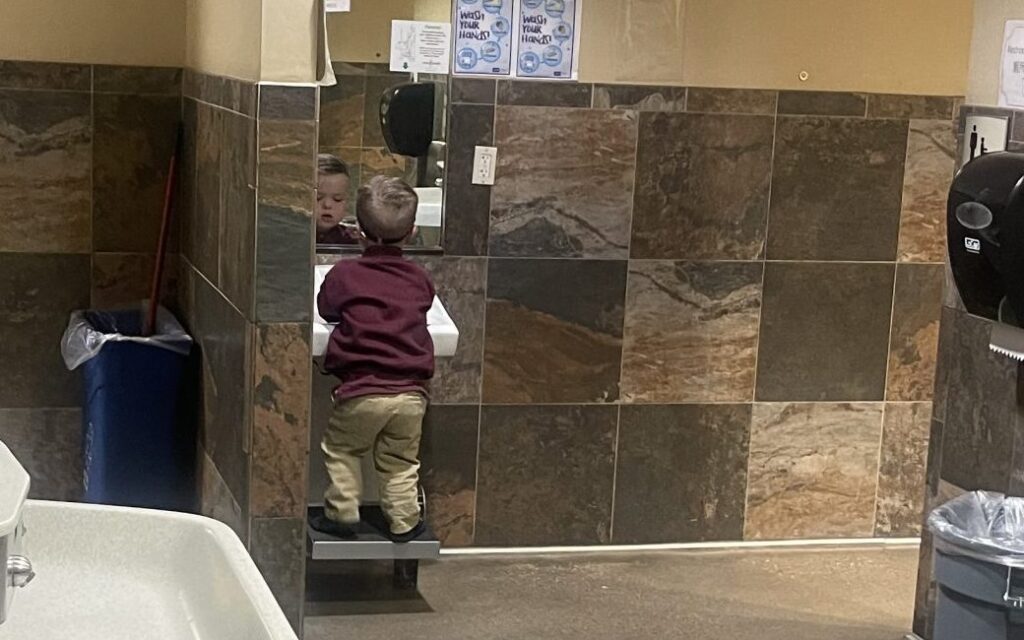Before International Leadership of Texas Keller K-8 installed a permanent Step ’n Wash unit, Zeke Elswood just used hand sanitizer.
He couldn’t reach the sink on his own.
Now, the second grader washes his hands just like everyone else.
Zeke, who has achondroplasia — the most common form of dwarfism — transferred to the campus this school year. Soon after, the school installed the fold-out, floor-anchored platform in the boys’ restroom.
Discreet, and available to anyone who needs it, the Step ’n Wash is a small addition with a big message, Zeke’s mom, Erin Elswood, said: Accessibility doesn’t have to single students out. When done right, it can benefit everyone.
“It was good,” Zeke said. “No one helped me. I could do it myself.”
‘Let’s make it happen’
The school’s commitment to making Zeke feel included, and not just accommodated, stood out from the beginning, said Elswood, a Keller ISD school counselor.
“I told them the best thing I’ve ever seen is the Step ’n Wash. And they said, ‘Well, then let’s make it happen,’” Elswood said. “It made such a huge difference. … He could wash his hands like everyone else and it didn’t call attention to his disability.”
That mattered not only as a parent, but as a counselor who’s spent her career helping schools support all kinds of learners, she said.
“Accessibility is necessary. But I think it’s also important that it doesn’t highlight a student’s disability, it just lets them feel included,” Elswood said. “Zeke’s used step stools before. This was the first time he could be totally independent.”
The Step ’n Wash unit was originally installed for Zeke, but Elswood said she’s heard that plenty of younger students use it, too.
“It’s built in. It folds up and down. It’s not just Zeke’s. It’s there for anyone who needs it,” she said.
The update had a practical impact on Zeke, too.
“It’s really important,” he said about washing his hands with soap and water. “It makes me feel good.”
The improvement, Elswood said, sends a message to other schools.
“Meet students where they’re at and help them feel like part of the community, not like outsiders who need accommodations,” she said.
Advocacy on a national scale
Elswood’s work extends beyond her son.
She’s also the co-director of a national advocacy campaign called “Mascots Matter,” which challenges schools to remove mascots that include disability slurs — including terms often used to disparage people with dwarfism.
This year, her group helped push legislation in three states and convinced a high school in North Dakota to retire its mascot voluntarily.
Now, she hopes the same advocacy strategy can lead to more inclusive school buildings.
“Taking the extra step to install things like this are important for the mental health and social-emotional well-being of the student,” Elswood said.
School is enjoyable to Zeke. He said he loves his teachers, his special education classes and the new step that helps him feel more independent.
When he grows up, he wants to be a firefighter — inspired by another little person who volunteers at a Pennsylvania fire department.
Did it feel good to take that first step?
Zeke smiled and nodded.
“Proud, too,” he said.
Matthew Sgroi is an education reporter for the Fort Worth Report. Contact him at [email protected] or @matthewsgroi1.
At the Fort Worth Report, news decisions are made independently of our board members and financial supporters. Read more about our editorial independence policy here.
Related
Fort Worth Report is certified by the Journalism Trust Initiative for adhering to standards for ethical journalism.
Republish This Story
![]()


